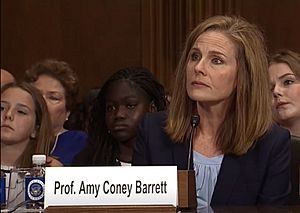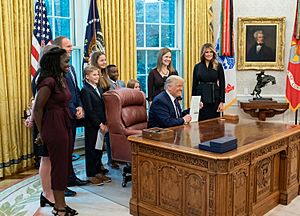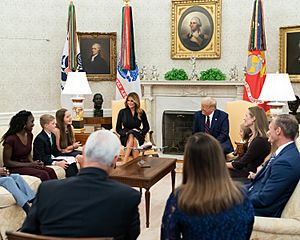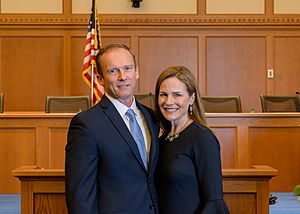Amy Coney Barrett facts for kids
Quick facts for kids
Amy Coney Barrett
|
|
|---|---|
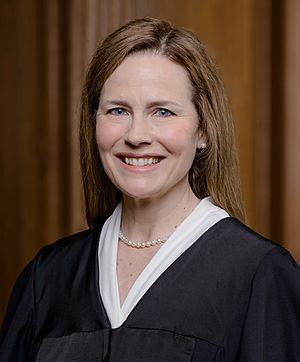
Official portrait, 2021
|
|
| Associate Justice of the Supreme Court of the United States | |
| Assumed office October 27, 2020 |
|
| Nominated by | Donald Trump |
| Preceded by | Ruth Bader Ginsburg |
| Judge of the United States Court of Appeals for the Seventh Circuit | |
| In office November 2, 2017 – October 26, 2020 |
|
| Nominated by | Donald Trump |
| Preceded by | John Daniel Tinder |
| Succeeded by | Thomas Kirsch |
| Personal details | |
| Born |
Amy Vivian Coney
January 28, 1972 New Orleans, Louisiana, U.S. |
| Spouse |
Jesse Barrett
(m. 1999) |
| Children | 7 |
| Education | Rhodes College (BA) University of Notre Dame (JD) |
| Signature | |
Amy Vivian Coney Barrett (born January 28, 1972) is an American lawyer and jurist serving since 2020 as an associate justice of the Supreme Court of the United States.
The fifth woman to serve on the court, she was nominated by President Donald Trump and has served since October 27, 2020. Barrett was a U.S. circuit judge on the U.S. Court of Appeals for the Seventh Circuit from 2017 to 2020.
Barrett graduated from Rhodes College before attending Notre Dame Law School, earning a J.D. with distinction in 1997. She then clerked for Judge Laurence Silberman and Justice Antonin Scalia. In 2002, Barrett joined the faculty at Notre Dame Law School, becoming a professor in 2010. While serving on the federal bench, she has continued to teach civil procedure, constitutional law, and statutory interpretation.
On September 26, 2020, Trump nominated Barrett to succeed Ruth Bader Ginsburg on the Supreme Court of the United States. Her nomination was controversial because the 2020 presidential election was only 38 days away and Senate Republicans had refused to hold hearings for Merrick Garland during an election year in 2016. The next month, the U.S. Senate voted 52–48 to confirm her nomination, with all Democrats and one Republican in opposition.
Described as a protégée of Justice Antonin Scalia, Barrett supports textualism in statutory interpretation and originalism in constitutional interpretation. She is generally considered to be among the Court's conservative bloc.
Contents
Early life and education
Amy Vivian Coney was born in 1972 in New Orleans, Louisiana, to Linda (née Vath) and Michael Coney. The eldest of seven children, she has five sisters and a brother. Her father worked as an attorney for Shell Oil Company, and her mother was a high school French teacher and homemaker. Barrett has Irish and French ancestry. Her maternal ancestors were from Ballyconnell, County Cavan, Ireland, while there is also Irish lineage among her father's ancestors. Her great-great-grandparents emigrated from France to New Orleans. Her family is devoutly Catholic, and her father is an ordained deacon at St. Catherine of Siena Parish in Metairie, Louisiana, where she grew up.
Barrett attended St. Mary's Dominican High School, an all-girls Roman Catholic high school in New Orleans. She was student body vice president of the school and graduated in 1990. After high school, Barrett attended Rhodes College in Memphis, Tennessee, where she majored in English literature and minored in French. She considers herself "somewhat fluent" in French, but with a Louisiana accent. Barrett graduated in 1994 with a Bachelor of Arts, magna cum laude, and was inducted into Omicron Delta Kappa and Phi Beta Kappa. In her graduating class, she was named most outstanding English department graduate.
Barrett then attended Notre Dame Law School on a full-tuition scholarship. She was an executive editor of the Notre Dame Law Review and graduated in 1997 ranked first in her class with a Juris Doctor summa cum laude.
Legal career
Barrett spent two years as a judicial law clerk after law school, first for judge Laurence Silberman of the U.S. Court of Appeals for the District of Columbia Circuit from 1997 to 1998, and then for justice Antonin Scalia of the U.S. Supreme Court from 1998 to 1999.
From 1999 to 2002, Barrett practiced law at Miller Cassidy Larroca & Lewin, a boutique law firm for litigation in Washington, D.C., that merged with the Houston, Texas-based law firm Baker Botts in 2001. While at Baker Botts, she worked on Bush v. Gore, the lawsuit that grew out of the 2000 United States presidential election, providing research and briefing assistance for the firm's representation of George W. Bush.
In 2001, Barrett was a visiting associate professor and John M. Olin Fellow in Law at George Washington University Law School. In 2002, she joined the faculty of her alma mater, Notre Dame Law School. At Notre Dame, she taught federal courts, evidence, constitutional law, and statutory interpretation. In 2007, she was a visiting professor at the University of Virginia School of Law. Barrett was named a professor of law at Notre Dame in 2010, and from 2014 to 2017 held Notre Dame's Diane and M.O. Miller II Research Chair of Law. Her scholarship focused on constitutional law, originalism, statutory interpretation, and stare decisis. Her academic work has been published in the Columbia, Cornell, Virginia, Notre Dame, and Texas law reviews.
At Notre Dame, Barrett received the "Distinguished Professor of the Year" award three times. From 2011 to 2016, she spoke on constitutional law at Blackstone Legal Fellowship, a summer program for law school students that the Alliance Defending Freedom established to inspire a "distinctly Christian worldview in every area of law". While serving on the Seventh Circuit, Barrett commuted between Chicago and South Bend, continuing to teach courses on statutory interpretation and constitutional theory.
In 2010, Chief Justice John Roberts appointed Barrett to serve on the Advisory Committee for the Federal Rules of Appellate Procedure.
On May 8, 2017, President Donald Trump nominated Barrett to the U.S. Court of Appeals for the Seventh Circuit—the federal appellate court covering Illinois, Indiana, and Wisconsin—after Judge John Daniel Tinder took senior status. A Senate Judiciary Committee hearing on her nomination was held on September 6, 2017. During the hearing, Senator Dianne Feinstein questioned Barrett about a law review article Barrett co-wrote in 1998 with Professor John H. Garvey in which they argued that Catholic judges should in some cases recuse themselves from death penalty cases due to their moral objections to the death penalty. Asked to "elaborate on the statements and discuss how you view the issue of faith versus fulfilling the responsibility as a judge today," Barrett said that she had participated in many death-penalty appeals while serving as law clerk to Scalia, adding, "My personal church affiliation or my religious belief would not bear on the discharge of my duties as a judge" and "It is never appropriate for a judge to impose that judge's personal convictions, whether they arise from faith or anywhere else, on the law." Barrett emphasized that the article was written in her third year in law school and that she was "very much the junior partner in our collaboration." Worried that Barrett would not uphold Roe v. Wade given her Catholic beliefs, Feinstein followed Barrett's response by saying, "the dogma lives loudly within you, and that is a concern."
The hearing made Barrett popular with religious conservatives. Feinstein's and other senators' questioning was criticized by some Republicans and other observers, such as university presidents John I. Jenkins of the University of Notre Dame and Christopher Eisgruber of Princeton, as an improper inquiry into a nominee's religious belief that employed an unconstitutional "religious test" for office; others, such as Nan Aron, defended Feinstein's line of questioning.
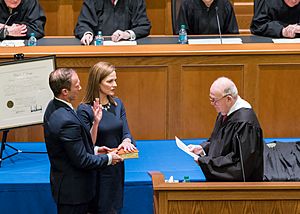
Lambda Legal, an LGBT civil rights organization, co-signed a letter with 26 other gay rights organizations opposing Barrett's nomination. The letter expressed doubts about her ability to separate faith from her rulings on LGBT matters. During her Senate hearing, Barrett was questioned about landmark LGBTQ legal precedents such as Obergefell v. Hodges, United States v. Windsor, and Lawrence v. Texas. She said these cases are "binding precedents" that she intended to "faithfully follow if confirmed" to the appeals court, as required by law. The letter Lambda Legal co-signed read, "Simply repeating that she would be bound by Supreme Court precedent does not illuminate—indeed, it obfuscates—how Professor Barrett would interpret and apply precedent when faced with the sorts of dilemmas that, in her view, 'put Catholic judges in a bind.'"
Barrett's nomination was supported by every law clerk she had worked with and all of her 49 faculty colleagues at Notre Dame Law school. 450 former students signed a letter to the Senate Judiciary Committee supporting her nomination.
On October 5, 2017, the Senate Judiciary Committee voted 11–9 on party lines to recommend Barrett and report her nomination to the full Senate. On October 30, the Senate invoked cloture by a vote of 54–42. It confirmed her by a vote of 55–43 on October 31, with three Democrats—Joe Donnelly, Tim Kaine, and Joe Manchin—voting for her. She received her commission two days later. Barrett is the first and only woman to occupy an Indiana seat on the Seventh Circuit.
Nomination to the Supreme Court
Barrett was on Trump's list of potential Supreme Court nominees since 2017, almost immediately after her court of appeals confirmation. In July 2018, after Justice Anthony Kennedy's retirement announcement, she was reportedly one of three finalists Trump considered, along with Kavanaugh and Judge Raymond Kethledge.
After Kavanaugh's selection in 2018, Barrett was viewed as a possible nominee for a future U.S. Supreme Court vacancy. After the death of Associate Justice Ruth Bader Ginsburg on September 18, 2020, Barrett was widely mentioned as the front-runner to succeed her. On September 26, 2020, Trump announced his intention to nominate Barrett to fill the vacancy created by Ginsburg's death.
Barrett's nomination was generally supported by Republicans, who sought to confirm her before the 2020 United States presidential election. She was a favorite among the Christian right and social conservatives. Democrats generally opposed the nomination, and were opposed to filling the court vacancy while election voting was already underway in many states. Many observers were angered by the move to fill the vacancy only four months before the end of Trump's term, as the Senate Republican majority had refused to consider President Barack Obama's nomination of Merrick Garland in 2016, more than ten months before the end of his presidency.
In October, the American Bar Association rated Barrett "well qualified" for the Supreme Court opening, its highest rating. The ABA confines its evaluation to the qualities of "integrity, professional competence, and judicial temperament". Barrett's nomination came during a White House COVID-19 outbreak. On October 5, Senator Lindsey Graham formally scheduled the confirmation hearing, which began on October 12 as planned and lasted four days. On October 22, the Judiciary Committee reported her confirmation favorably by a 12–0 vote, with all 10 Democrats boycotting the committee meeting. On October 25, the Senate voted mostly along party lines to end debate on the confirmation. On October 26, the Senate confirmed Barrett to the Supreme Court by a vote of 52–48, 30 days after her nomination and 8 days before the 2020 presidential election. Every Republican senator except Susan Collins voted to confirm her, whereas every member of the Senate Democratic Caucus voted in opposition. Barrett is the first justice since 1870 to be confirmed without a single vote from the Senate minority party.
The nature of her appointment was criticized by numerous Democratic politicians; Senate minority leader Chuck Schumer called it "the most illegitimate process I have ever witnessed in the Senate." Republicans responded that they were merely exercising their constitutional rights, and that accusations of hypocrisy were nothing more than "an unwarranted tantrum from the left".
U.S. Supreme Court (2020–present)
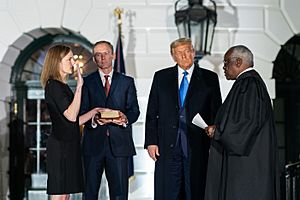
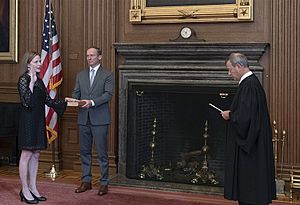
Barrett became the 103rd associate justice of the Supreme Court of the United States on October 27, 2020. On the evening of the confirmation vote, Trump hosted a swearing-in ceremony at the White House. As Barrett requested, Justice Clarence Thomas administered the oath of office to her, the first of two necessary oaths. She took the judicial oath, administered by Chief Justice John Roberts, the next day.
Upon joining the Court, Barrett became the only justice who did not receive their Juris Doctor from Harvard or Yale. She is also the first justice without an Ivy League degree since the 2010 retirement of John Paul Stevens (who graduated from the University of Chicago and Northwestern University School of Law) and the first to be appointed since Sandra Day O'Connor, who graduated from Stanford University and Stanford Law School. She is the first graduate of Notre Dame Law School and the first former member of the Notre Dame faculty to serve on the Supreme Court.
Barrett uses her maiden and married surnames in public. She has chosen to be called "Justice Barrett" in written orders and opinions of the court, as she did as a Seventh Circuit judge.
Personal life
In 1999, Barrett married fellow Notre Dame Law School graduate Jesse M. Barrett, a partner at SouthBank Legal – LaDue Curran & Kuehn LLC, in South Bend, Indiana, and a law professor at Notre Dame Law School. Previously, Jesse Barrett had worked as an Assistant U.S. Attorney for the Northern District of Indiana for 13 years. The couple live in South Bend and have seven children, two of whom were adopted from Haiti, one in 2005 and one after the 2010 Haiti earthquake. Their youngest biological child has Down syndrome.
Affiliations
Barrett was a member of the Federalist Society from 2005 to 2006 and from 2014 to 2017. She is a member of the American Law Institute.
See also
 In Spanish: Amy Coney Barrett para niños
In Spanish: Amy Coney Barrett para niños


